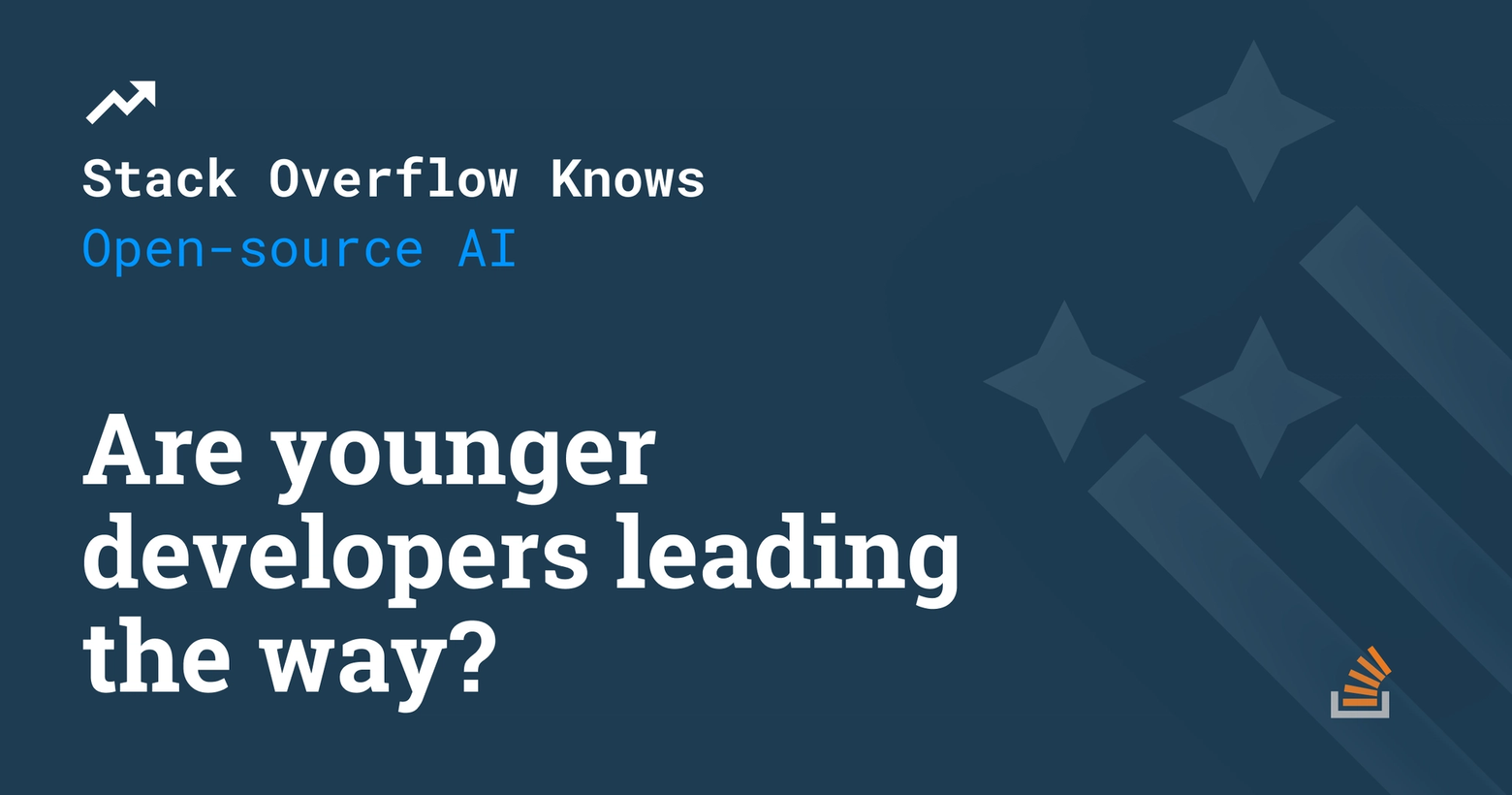The emergence of powerful and cost-effective open-source models has intensified the debate between open-source and proprietary AI. Open-source projects, which encourage community contribution and transparency, have been fundamental to the internet's development, and have encouraged the growth of community platforms like Stack Overflow. Governments across the world are considering legislation and pledging substantial investments towards making AI a public good. Even OpenAI's Sam Altman acknowledged the potential downsides of a solely closed-source strategy and the company has since hinted at eventually incorporating open source into their strategy.
We wanted to learn more about how developers feel about open-source AI. In March, over 1,000 developers and technologists gave us insights into what they think about open source and the role it plays with AI.
Open-source AI stands to benefit experienced practitioners of open-source code the most given their knowledge of the benefits of transparency and community open source provides. Emerging technologies are often championed by in-school or early-career developers who will be the first to learn and experiment with new technologies; this survey validates that trust and learning are central to younger developers' interactions with open-source AI.
A generational divide: experience and open-source AI adoption
In our survey of Stack Overflow users, we found that most (82%) have some or a great deal of experience with open-source tech. This insight is not surprising given that open-source technology thrives on community platforms that have the potential to speed up innovation as many contributors review and enhance projects, models, and libraries.
Stack Overflow Q&A trends indicate that support for open-source tech is very strong: in the last 365 days, 40% of the top 1,000 tags used in questions and answers on Stack Overflow have been related to open-source software. Open-source content on Stack Overflow includes technologies that have clear open-source licenses (MIT, Apache, GPL, BSD, etc.), have open standards and protocols, or are otherwise recognized as community-driven projects. Popular tags for open source include Python and Flutter, while popular tags for proprietary tech include C# and Android.
Our survey found that early-career respondents lack open-source experience: the largest proportion of those with no experience using open source have the least work experience (12% of respondents with less than five years experience). This group also has the largest proportion of those unsure if they have used open source technologies. Open-source technology is a longstanding trend in the developer space, but its impact can sometimes be subtle: 9% of all respondents indicated they weren’t sure if they had experience with open-source technologies.
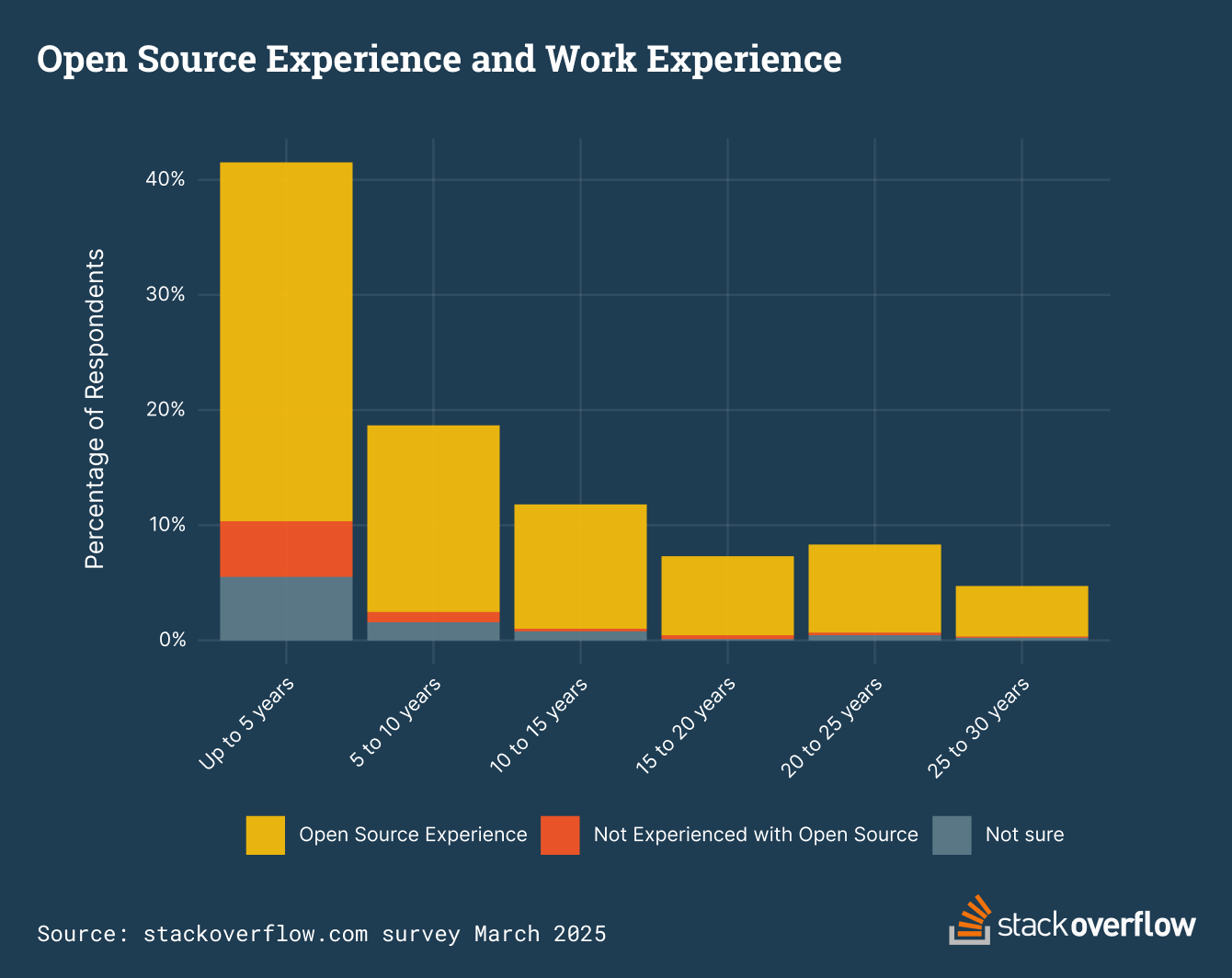
Most respondents prefer open-source activities compared to proprietary when asked to rate how much they like engaging in them, but most also indicate a preference for AI chatbots, too. The top activities for preferred engagement were:
- Maintaining or giving feedback to open-source projects (57% like it)
- Engaging in online communities (50% like it)
- Interacting with AI chatbots (49% like it)
Conversely, the activities that respondents were disinclined to engage with were:
- Contributing to closed source AI models (37% do not like it)
- AI companies (30% do not like it)
- Using proprietary technologies or tools for work or school (27% do not like it)
Younger age groups have slightly higher scores for positive engagement and more mature age groups show slightly higher scores for negative engagement. Younger respondents (20-34) had higher positive scores for AI chatbots than overall respondents, while more mature respondents (35-54) had higher negative scores of using proprietary technology at work or school. Thinking about behavioral psychology, this data shows the act of conversation may have something to do with how different age groups prefer to work. These data points illuminate a digital landscape in flux: community is important to all, some have become ingrained in these communities over time as active contributors, and some have yet to find their place in this ecosystem but can find feedback with the help of AI while exploring open-source projects and online communities.
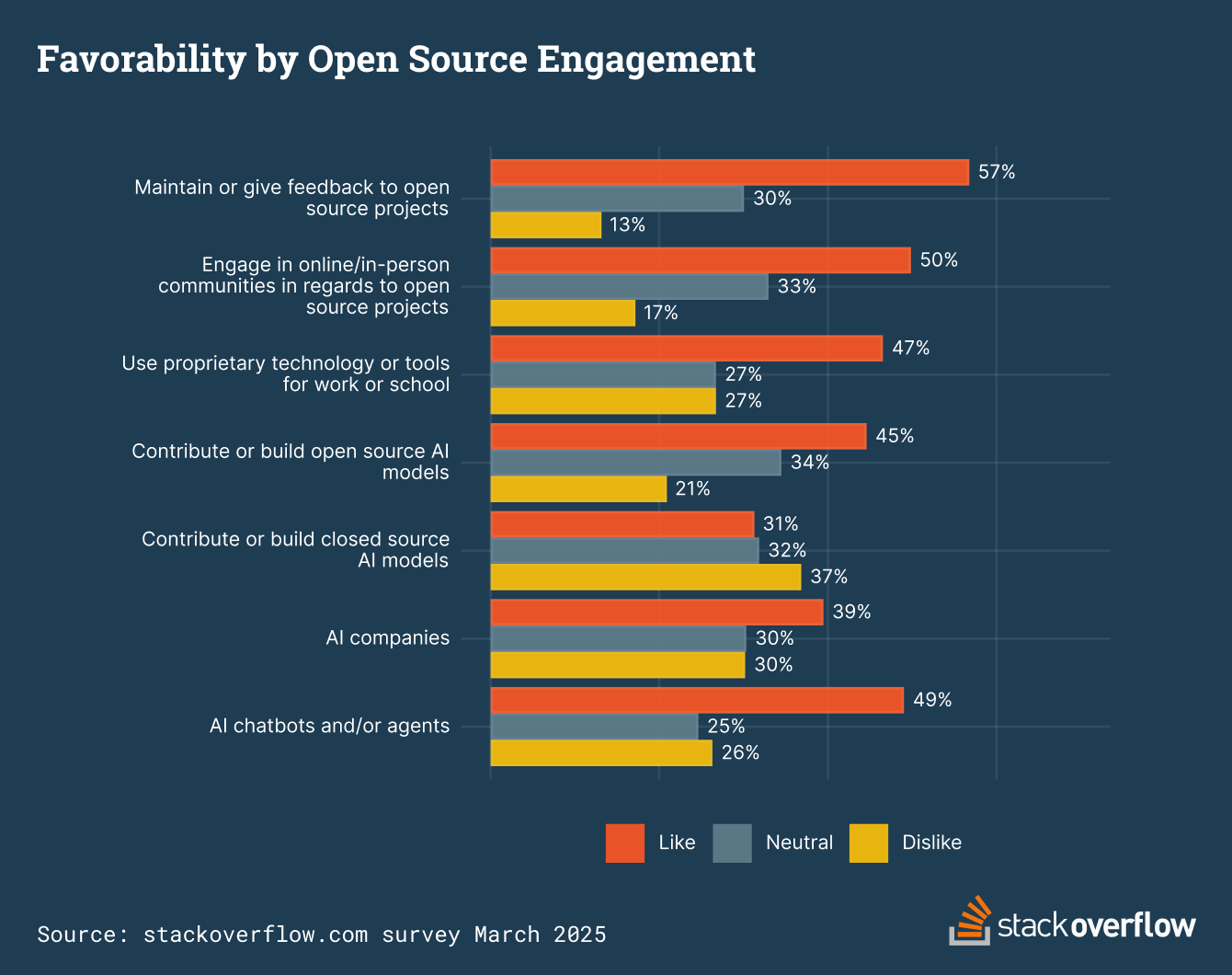
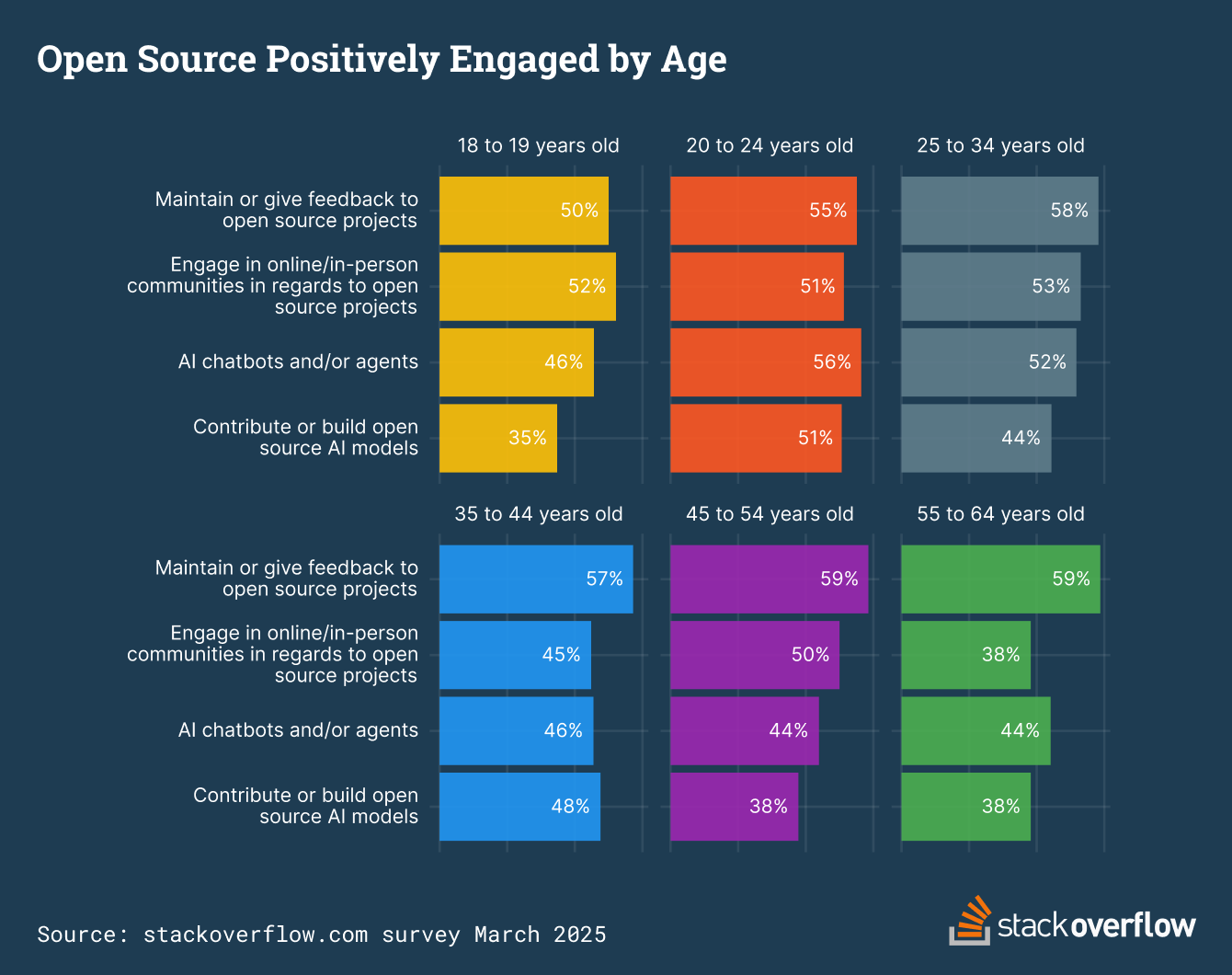
Preferences among different age groups towards open source suggest that age and experience level may determine what draws developers and technologists to different technologies. However, online communities act as a bridge between users and opportunities to learn from others and engage more. The idea that online communities serve a dual purpose of learning and boosting open-source initiatives is not new. In a Stack Overflow blog post on accidental innovation, Heather Meeker outlined the merits of collaboration via open-source projects and the ways open-source maintainers frequently encounter uses for their projects in unexpected ways, revealing bugs and prompting changes that also align with community needs. The spirit of collaboration is the internal combustion engine of open source growth; in 2024, 93% of GitHub users agreed engaged and responsive project maintainers are important in open-source projects as indicated by a survey on open-source conducted by GitHub.
Trust in AI: open-source vs. proprietary
Trust with open-source AI scores highly in the survey for some key applications when compared to proprietary AI. Its highest-rated use is learning, specifically among early-career developers and technologists.
In general, we know 31% of developers are still skeptical about using AI for development work. We asked users to rate their preference for both open-source AI and proprietary AI for creative or strategic work, development work and for learning or personal projects. Most users (66%) trust open-source AI for personal or school projects or for development work (61%), which is more than those (52% and 47% respectively) that trust proprietary AI for the same. Using proprietary AI for creative and strategic work had the lowest score for trust (43%).
Respondents with up to five years experience who trust both open-source and proprietary AI for work do so at the same propensity as their more experienced counterparts: 65% of those with less than five years of experience trust open-source AI for creative and strategic work, as do 69% of those with 15-20 years experience. Both groups trust proprietary AI for development work less: 53% for those with less than five years experience and 31% for those with 15-20 years experience.
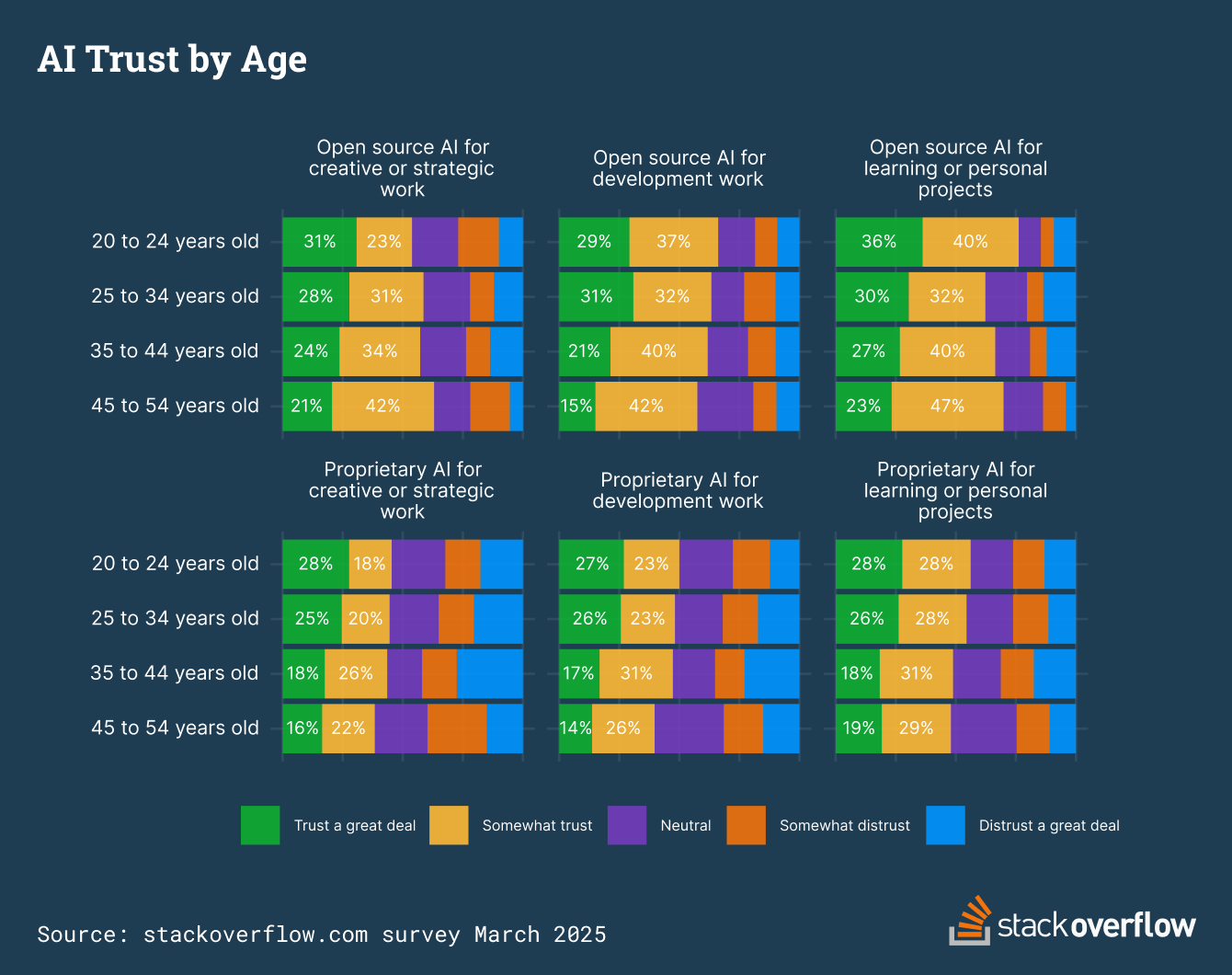
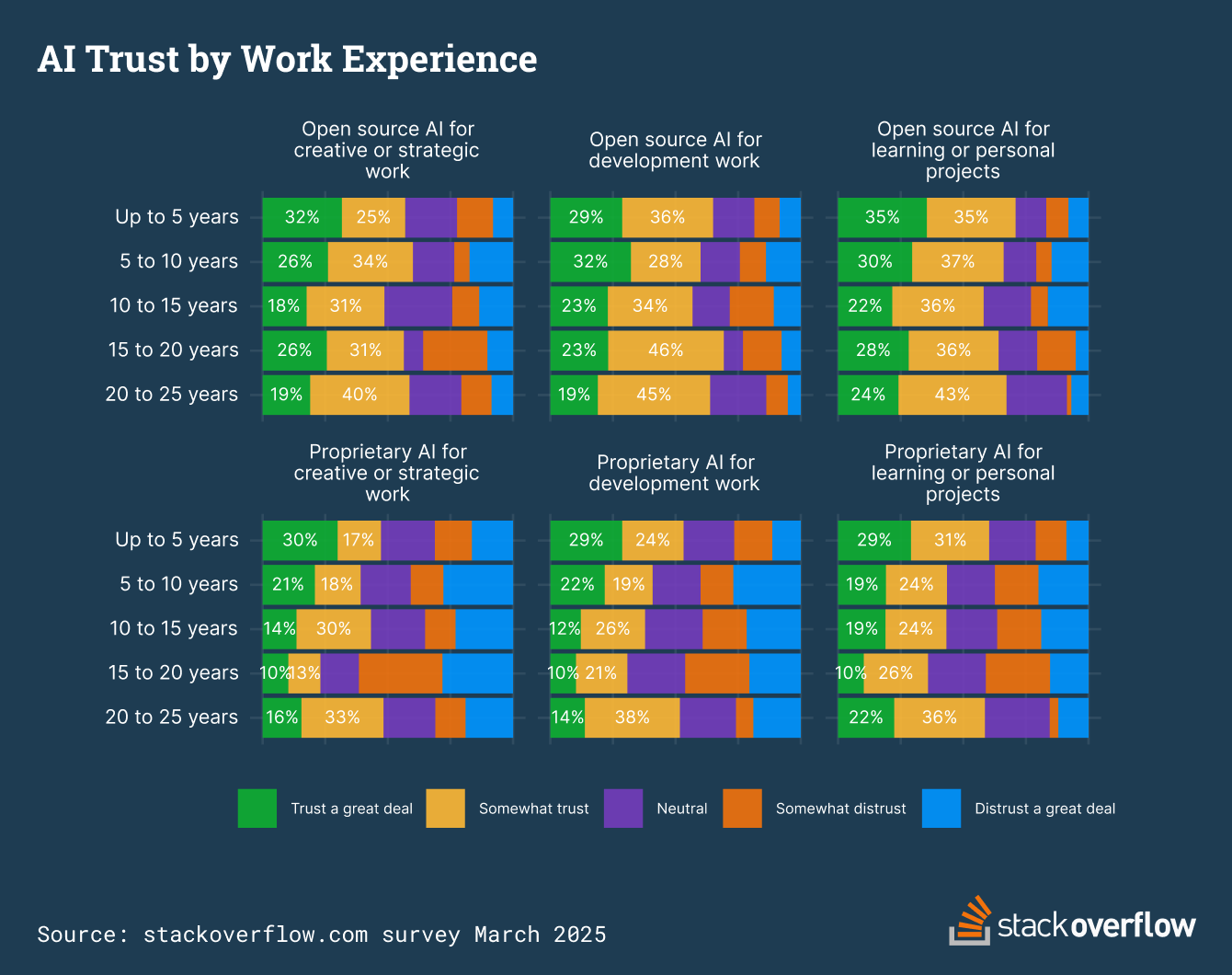
A study of the potential of open-source innovation on GitHub quantified its vast collection of public repositories and found that over 4.2 million users have published data files on the platform, while just about one third of those data files come from organizations. These organizations have more infrastructure and human bandwidth than individuals though most public repositories are created and maintained by individuals (78% of data-containing repos).
The researchers conclude there is a need for improved discoverability: making it easier for users to find relevant datasets on GitHub. Access to these datasets can help level the playing field for researchers and developers working on non-commercial projects who have limited resources. Similarly, more transparency lets developers see what data the models are trained on and how other users have interacted with them. Trust in data has been pivotal to the vision Stack Overflow is currently implementing on our community platform, where human-verified content is and has always been the driving force.
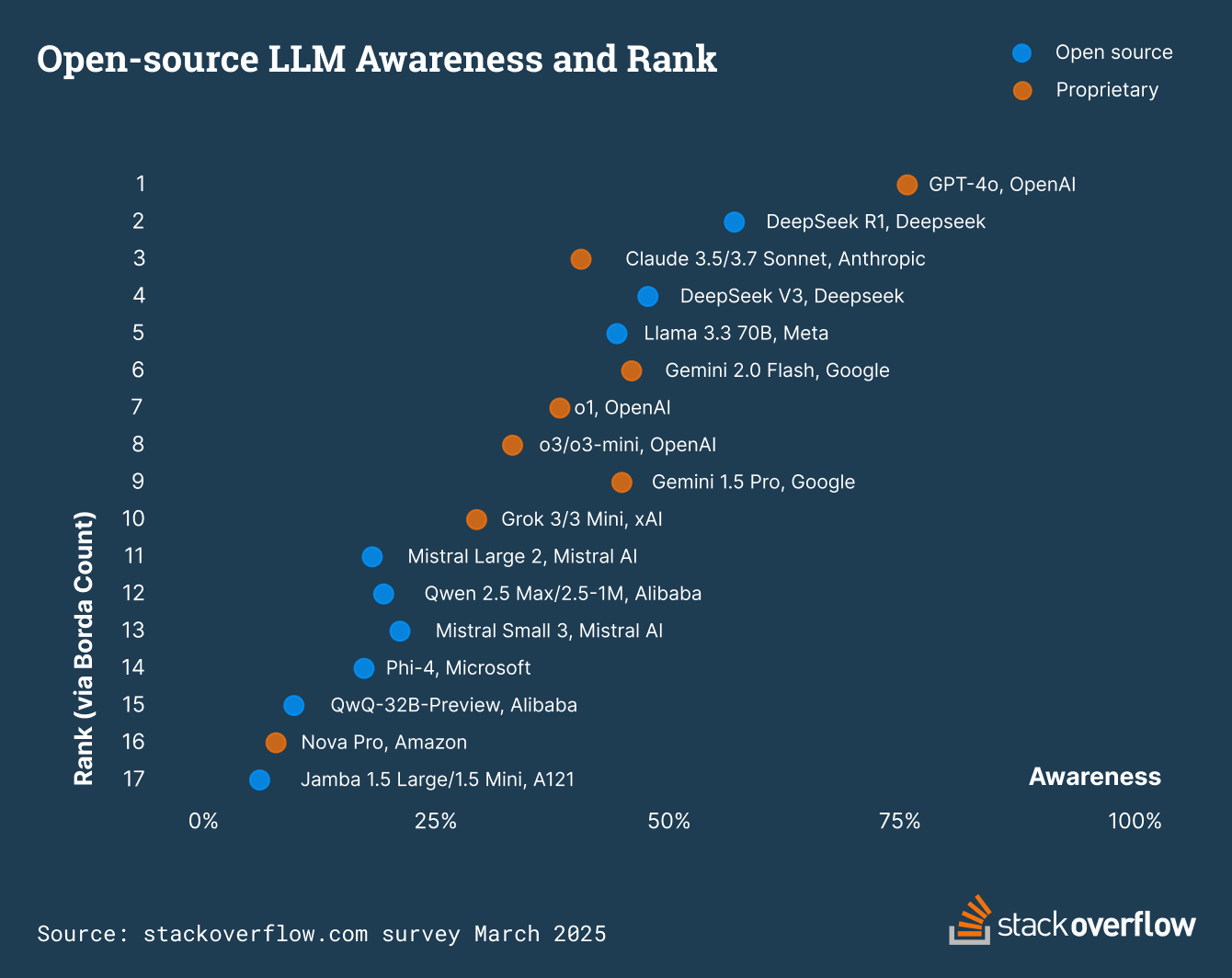
DeepSeek’s R1 and V3 models and Meta’s Llama 70B open-source models have the highest scores for awareness among all open-source LLMs. Proprietary models GPT-4o and Claude 3.5/3.7 Sonnet round up the top five LLMs in terms of overall awareness. Ranking them for preference, DeepSeek models are ranked in the top five, but Claude’s Sonnet model comes in third, right after DeepSeek R1. OpenAI’s proprietary ChatGPT model has been used by many, but usage doesn’t necessarily follow preferences, as we see proprietary (Claude) and open-source (Meta AI) LLMs have high preference (i.e. rank as displayed above) despite low usage as reported in the 2024 Developer Survey.
Building bridges: community, collaboration, and the future of AI
Make no mistake, open-source AI is not just a community project—it’s a legitimate business opportunity. The Stack Overflow podcast discussed the growing business value of open source with Amanda Brock, CEO of Open UK, back in 2022. With more companies offering open-source AI options to the public, project sustainability for maintenance and improvement over time will need to follow.
In that podcast conversation, Brock mentioned five key ways companies can invest in open-source projects:
- Provide paid maintenance and support
- Develop key proprietary features while maintaining an open core
- Managed services
- Dual-licensing
- Accepting donations or sponsorships to maintain or add features
One of the major potential drawbacks of open-source projects Brock points out is the issue of security. This is mirrored in our survey’s findings: 44% believe open-source AI is a security risk. A significant portion (48%) do not find security to be a significant threat, possibly weighing the benefits of open-source engagement from volunteers and businesses against the real risk of AI pushing the boundaries of the defense open source has incorporated to date. Investments in maintenance, discoverability, and security are important to the progress of open-source AI, and investments of this kind will be boosted by the strong belief that AI should be open source as a matter of ethics: 86% agree that open-source AI serves the public’s best interest.
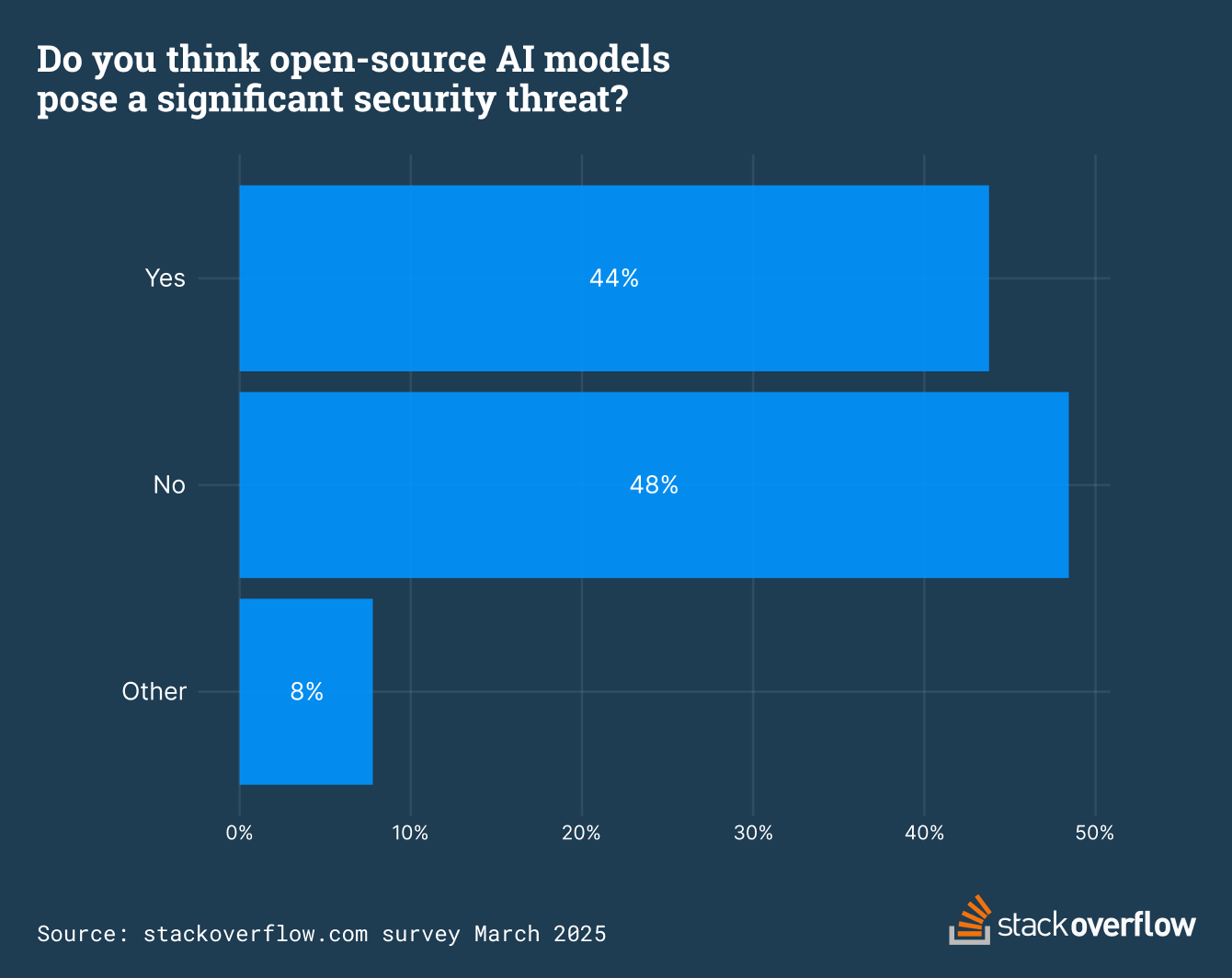
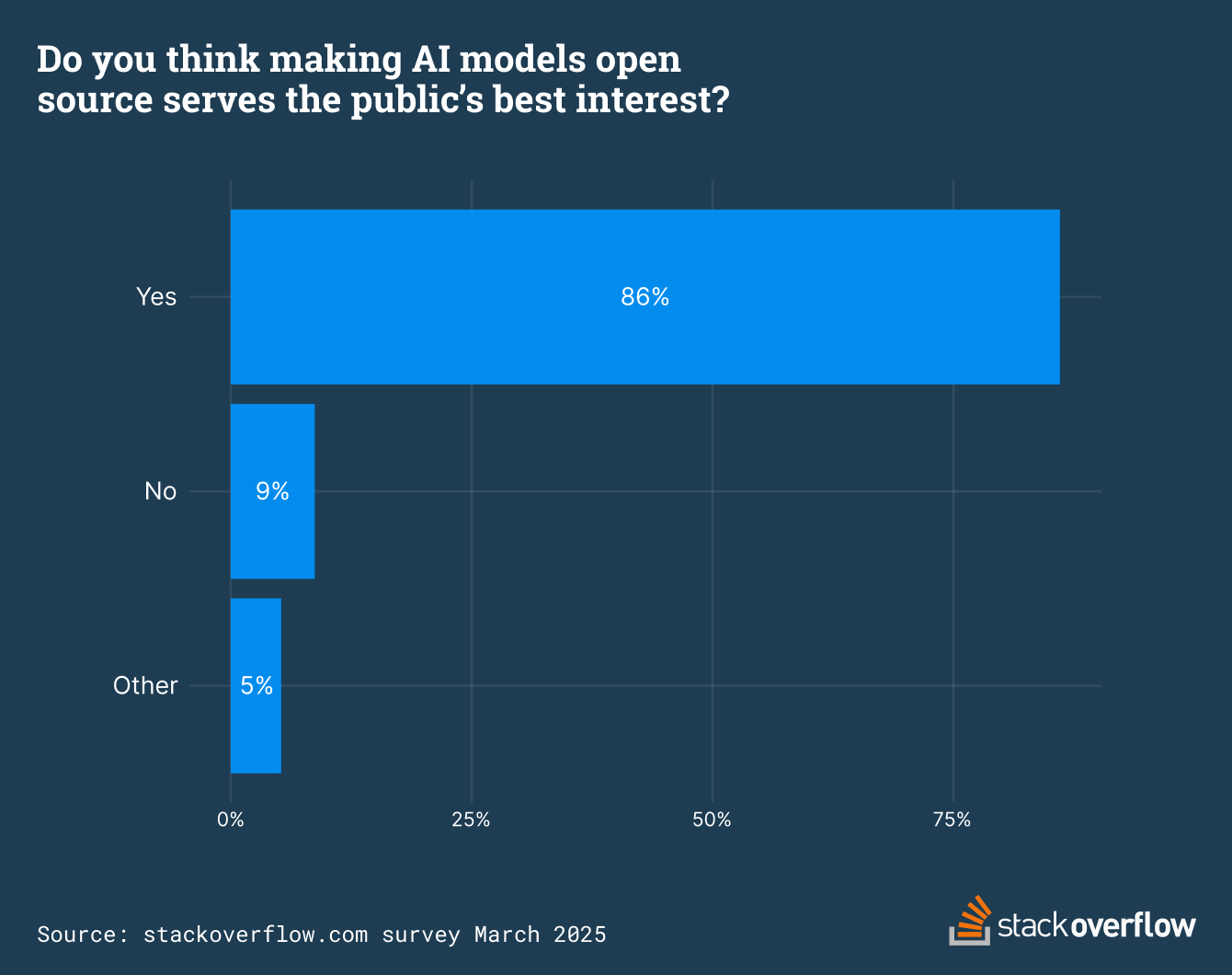
The findings in our latest survey highlight a convergence: a sustained belief in open source among experienced developers coupled with a growing embrace of open-source AI by the next generation. While seasoned technologists value open source for its established benefits—transparency, community collaboration, and control—younger developers are drawn to open-source AI for its learning potential and trustworthiness. The popularity of open-source models suggests a potential shift in the AI landscape toward open-source and away from proprietary models.
However, realizing the full promise of open-source AI requires addressing the ongoing challenge of discoverability. Facilitating knowledge sharing through online communities and improving the visibility of open-source projects and datasets will be essential to empowering both current and future generations of AI developers. Open-source familiarity, its perceived trustworthiness, and bridging the open-source experience gap with early-career developers may rest in the strength of open-source communities.
